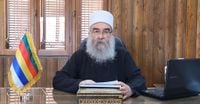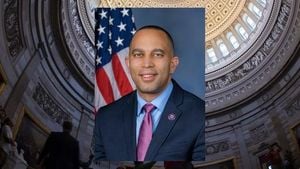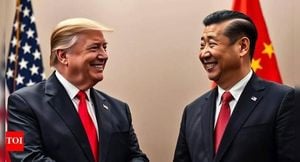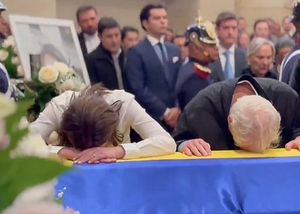In the heart of southern Syria, the province of Suwayda has become the latest flashpoint in the country’s protracted conflict, with violence erupting in mid-July 2025 and leaving a devastating toll in its wake. Over the past month, more than 1,200 people have been killed, thousands have been forced to flee their homes, and entire communities have been left without basic necessities such as food, water, and electricity, according to multiple reports, including Shafaq News and the Associated Press.
At the center of the storm is Sheikh Hikmat Salman al-Hijri, the spiritual leader of Syria’s Druze community. On Saturday, August 9, 2025, al-Hijri issued a passionate plea for the international community to intervene. In a video statement, he called for an independent investigation into the violence and urged that those responsible be referred to the International Criminal Court (ICC). “Such acts amount to war crimes under the Geneva Conventions and the Rome Statute,” he declared, his voice carrying the weight of a community reeling from tragedy. Al-Hijri’s message was clear: the suffering in Suwayda cannot be allowed to continue unchecked.
The sequence of events that led to this crisis is complex, marked by shifting alliances and deep-seated mistrust. According to the Associated Press, the violence first broke out in mid-July between Druze militias and local Sunni Muslim Bedouin tribes. What began as local skirmishes quickly escalated when Syrian government forces intervened, ostensibly to restore order. However, as many in Suwayda saw it, the government soon appeared to be siding with the Bedouins against the Druze, further inflaming tensions.
The brutality of the clashes has shocked even those accustomed to Syria’s long-running civil war. Al-Hijri accused both armed groups and pro-government forces of what he described as “systematic genocide.” The list of alleged atrocities is harrowing: the execution of children and elderly men, the burning of homes with residents trapped inside, kidnappings, sieges, and the indiscriminate shelling of villages. “These are not isolated incidents,” al-Hijri insisted. “They are part of a deliberate campaign to destroy our community.”
Perhaps most galling to many Druze residents has been the response of state-run and allied media, which have framed the ongoing assaults as routine “security operations.” Al-Hijri condemned this narrative, saying it obscures the true scale of the crisis and undermines efforts to seek justice for the victims. He called on the United Nations to authorize an independent probe and to pressure for the withdrawal of all armed groups from Suwayda, enabling displaced residents to return safely to their homes.
International involvement in the conflict has added another layer of complexity. In a televised speech, al-Hijri thanked U.S. President Donald Trump, as well as Israel and Gulf Arab countries, for their assistance in ending the violence. “Thanks to those who stood by righteousness,” he said. According to the Associated Press, Israel played a particularly direct role, launching dozens of airstrikes on convoys of government fighters and even striking the Syrian Defense Ministry headquarters in central Damascus. The Druze, it’s worth noting, form a substantial community in Israel, where they are regarded as a loyal minority and often serve in the Israeli military. Al-Hijri described Israel’s intervention as a “humanitarian intervention” that limited the extent of the massacres against the Druze.
Al-Hijri’s appeal did not end with calls for justice. He also advocated for the deployment of international observer missions to protect civilians, arguing that only a robust international presence could prevent further atrocities. “We need the world to see what is happening here,” he said, “and to act before it is too late.”
The violence in Suwayda has also had significant political repercussions. On August 8, 2025, al-Hijri spoke remotely at a conference in Hassakeh, a city in northeastern Syria under the control of the Kurdish-led and U.S.-backed Syrian Democratic Forces (SDF). The conference brought together representatives of Syria’s various ethnic and religious groups, who called for the formation of a decentralized state and the drafting of a new constitution that guarantees religious, cultural, and ethnic pluralism. Al-Hijri’s participation underscored his commitment to a vision of Syria that respects diversity and protects minority rights.
However, not everyone welcomed the conference’s message. The Syrian government swiftly criticized the gathering, alleging that some of the attendees harbored secessionist ambitions. In response, the government announced that it would suspend planned talks with the SDF in Paris, which had been agreed upon in late July. According to the state news agency SANA, an unnamed government source claimed the conference violated an agreement reached in March with the SDF. No date had been set for the Paris talks, but their suspension is a stark reminder of the deep divisions that still plague Syria’s political landscape.
The failure of the July 15 ceasefire to halt the bloodshed in Suwayda has only deepened the sense of urgency. Residents describe a landscape scarred by destruction and fear. Entire villages have been emptied, and those who remain live in constant dread of renewed violence. Humanitarian organizations have struggled to reach those in need, hampered by ongoing fighting and the destruction of critical infrastructure.
For many outside observers, the crisis in Suwayda is emblematic of the broader challenges facing Syria as it seeks to emerge from more than a decade of war. The conflict has laid bare the country’s ethnic and religious fault lines, and efforts to forge a new political settlement have repeatedly foundered on mutual suspicion and competing visions for the future. Yet amid the despair, voices like al-Hijri’s offer a glimmer of hope—a reminder that even in the darkest times, there are those willing to stand up for justice and demand accountability.
As the world watches, the fate of Suwayda hangs in the balance. The calls for an international investigation, for the protection of civilians, and for a new, more inclusive political order echo far beyond the province’s borders. Whether the international community will heed these calls remains to be seen, but for the people of Suwayda, the need for action has never been more urgent.
With the province still reeling from violence and the political future of Syria uncertain, the coming weeks will be critical. The choices made now—by local leaders, by the Syrian government, and by the international community—will shape not only the fate of Suwayda but the future of Syria itself.





